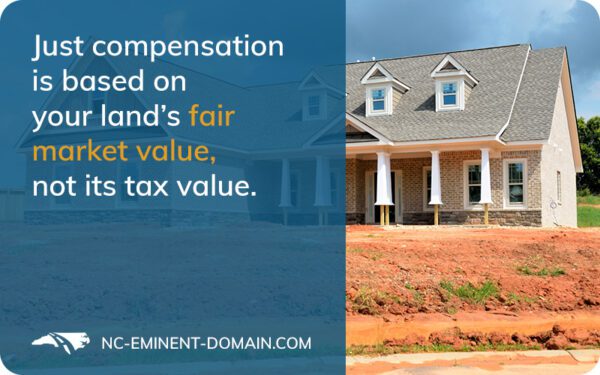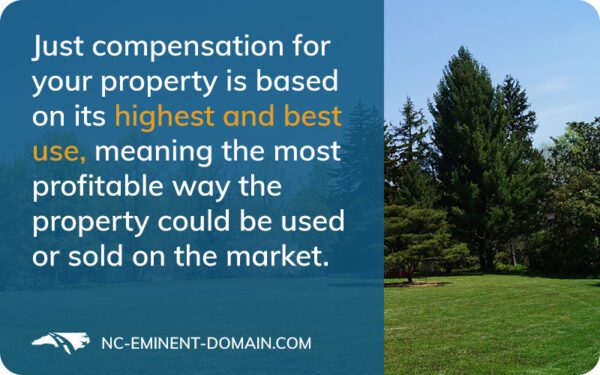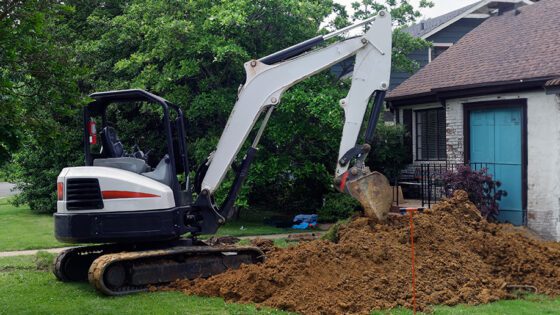When the NCDOT (or another condemning authority) takes your land, they owe you just compensation. Many people want to know if the condemning authority pays them this compensation based on the tax value of their property.
The short answer is: no, they do not.
The slightly longer answer is: no, they do not, nor do you want them to.
The U.S. Constitution guarantees that those whose property the government takes must receive “just compensation” in exchange. The idea of just compensation is that it’s an amount which ideally makes the property owner “whole” again, in the sense that it replaces the value of the land that was taken as well as the value lost from any remaining property.
What just compensation means in your individual situation is rarely straightforward. Calculating just compensation is based on many factors unique to your land, but the tax value of your property is not one of them.
Here are three reasons why:
#1: The tax value of your land is sometimes inaccurate for eminent domain purposes
The NCDOT hires their own appraisers to determine the value of your property before sending you an offer. They use this appraisal to interpret what the fair market value is for your property in their eyes. Fair market value and just compensation for your property are not based on the land’s tax value.
If they’re not planning to take all of your property, the condemning authority will determine the value before the taking, and then what they expect your property value to be after the project is completed. The difference between these two values is what they consider “just compensation.”

Don’t go off of the tax value you see every year when you have to pay your property taxes. Instead, get a free case evaluation from a knowledgeable attorney.
#2: Tax value is a formula – not an individual assessment
Property owners facing eminent domain may think they are getting a good deal because the condemning authority has met or exceeded tax value in their offer. For some owners, the tax value may be the same as the property’s real value, but this won’t always be (and is often not!) the case.
The tax value of your property is based on a formula applied across multiple properties to make it easy for the local government to generate property tax revenue without having to go through the time and cost of appraising each and every property. This means that while some tax values reflect what the property is actually worth, others are far below.
Getting $125,000 for a property with a tax value of $100,000 seems like a great deal until the owner finds out the property could have actually sold for much more.
Your property may be worth more than its tax value because just compensation should take into account not just what your property is being used for now, but the property’s “highest and best use.”

In that case, an offer for $125,000 is much less than you deserve and not a great deal at all.
#3: Your tax value may have been determined during market conditions that no longer apply
Was your property’s tax value determined during a recession or market high? Property tax values are determined at least every 8 years in North Carolina, but the market for property often changes far more quickly than that.
In the real estate world, you should always be armed with the most up-to-date information on the true value of your property right now.
If a property’s tax value was determined at the height of a recession, for example, it is much less likely to be an accurate reflection of value if property values have since returned to normal.
For these reasons and more, we recommend not settling for the tax value of your property unless you have up-to-date information showing that the tax value is indeed the true value of the property. Instead, you should consult with an experienced attorney and pursue the eminent domain fair market value for your property based on its highest and best use.
So what is the eminent domain fair market value for your land?
Your property’s eminent domain fair market value – and thus what you may be owed in just compensation – can be determined by many factors, including:
- The size of your property
- The location of your property
- How much properties like yours have recently sold for (typically investigated for residential properties)
- How much income your property generates (typically investigated for commercial properties)
- How accessible your property is
- How zoning laws apply to your property
- Unique aspects your property possesses, such as water features
- The level of development on and around your property
- How your property is currently being used
- Your property’s “highest and best use”
- How the condemning authority intends to use your property
Note: Unfortunately, your emotional connection to your property is not a factor that’s included in determining just compensation or eminent domain fair market value.
How the NC Eminent Domain Law Firm can help you
When trying to determine the true value of your property, don’t just get your own appraisal. Get the help of an experienced eminent domain attorney.
Our firm is led by four attorneys who formerly worked for the NCDOT, handling some of their most high-stakes cases. And we’re proud of the results we’ve achieved for clients. Since our firm began, we’ve tripled our clients’ offers from the government on average (a more than197% increase!).1
We work on a contingency fee basis, meaning we advance all the costs of building your case for more compensation than the government is offering. Your initial offer is 100% yours to keep. If we don’t help you get an increase, we don’t get paid – that’s our second-check guarantee!
Not sure if you’re getting a fair offer for your property? Get clarity at no cost with a free case evaluation. Call 1-877-393-4990 today!



